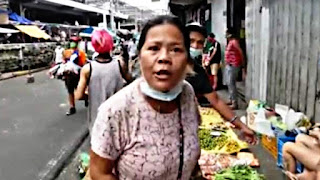Viral woman vendor slamming ‘no vax, no ride’ policy, gov’t failures in hot pursuit
By Rjay Zuriaga Castor
 |
| PHOTO: Screen-grabbed from INQUIRER.Net (YouTube) |
“Nabalitaan ko sa public market na hinahanap ako ng mga pulis doon at chairman at kakasuhan daw ako. Wala naman akong ginawang masama. Sinabi ko lang ang saloobin ko. Sinabi ko lang kung ano ang nararamdaman ko. Masama ba ‘yun?”
The viral vendor identified as Gemma Parina cried foul over reports that she is being searched at the Paco Market in Manila by authorities following her remarks slashing the government’s “no vaccine, no ride” policy for public transportation.
Video courtesy of INQUIRER.Net
In an exclusive interview via Radyo Inquirer On-Line on Friday, January 21, the viral vendor was in tears explaining her side and apologizing for her outburst while appealing to President Rodrigo Duterte to halt the policy’s implementation.
“Ngayon ay taos puso akong humihingi ng apology sa lahat ng nabanggit ko dala ng sama ng loob at galit na rin dahil sa sobrang kahirapan na nangyari sa amin ngayon dulot ng krisis at dulot ng COVID,” Parina said.
“Mula nung pandemic, talagang hindi na nawala ang mga utang ko sa Meralco at bills, hanggang ngayon ay binabayaran ko pa rin yun. Ngayon ako ay taos pusong humihingi ng kapatawaran sa lahat ng nabanggit ko,” she added.
Video courtesy of INQUIRER.Net
Parina, who claimed that COVID-19 is merely part of the government’s scheme to steal from Filipinos, issued the apology after her video made rounds on social media as she took a swipe on the “no vaccine, no ride” policy, the government’s overall pandemic response, social amelioration program, Meralco’s rising bills, and the Duterte administration’s loans from China.
Parina clarified that her outburst in the viral video was also due to the plight of her covendors amidst pandemic, adding that authorities are repeatedly confiscating their daily source of income.
“Dala lang po yun ng bugso ng damdamin ko at galit dahil sa sobrang hirap ng dinadanas namin. Kaming mga mahihirap, vendors, kahit anong hanapbuhay namin sa kalsada, nandyan na yung makipagsapalaran ka, hinuhuli ka, tapos kinikumpiska ang paninda mo, wala nang balikan,” Parina said.
“Kaya kanına, kung nagpunta ako sa palengke, ayaw na naman ako pasakayin, ayaw akong papasukin, parang ang liit ng mundo ko,” she added. To recall, Parina was on her way to the public market to buy food for her family but was barred from using public transport because of the “no vaccine, no ride” rule enforced by the Department of Transportation (DOTr).
Amidst her struggles of living a normal life because of the enforced rule, Parina called on Duterte to stop the controversial policy, saying some unvaccinated individuals like her refuse to get inoculated because of health issues.
“Ako rin po Pangulong Duterte, talagang nung unang umupo kayo, idolong-idolo ko po kayo, kaya lang Pangulo, nawalan ako nung [interes] nung pinatupad mo yung no vaccine, no ride, parang sumama na rin ang loob ko. Paano po ako makapaghanapbuhay kung yun ang ipapatupad niyo?” she stressed.
“Sana po Pangulo, wag nyo na lang ipipilit ang no vaccine no ride kasi paano po kami na wala kaming vaccine? Sa katulad ko po, napakahina ng immune system ko, marami akong sakit, pano po ako makapag-vaccine?” she added.
The Department of Transportation (DOTr) on Monday, January 17, started the implementation of its “no vaccination, no ride” policy for all modes of public transportation in Metro Manila. The measure cited the already high vaccination rate as justification to further restrict the movement of unvaccinated individuals.
Exempted from the policy are commuters with medical conditions that prevent them from getting the vaccine- but must present a certification from and the contact details of the physician; those getting or delivering essential goods and services; and, those headed to inoculation sites yet to receive a vaccine.
While it acknowledges the government’s efforts because of certain circumstances amid the COVID-19 threat, the Commission on Human Rights (CHR) on the “The Mangahas Interviews” said the government should provide a non-discriminatory response rather than a policy that restricts the public from exercising their freedom of mobility and movement.
